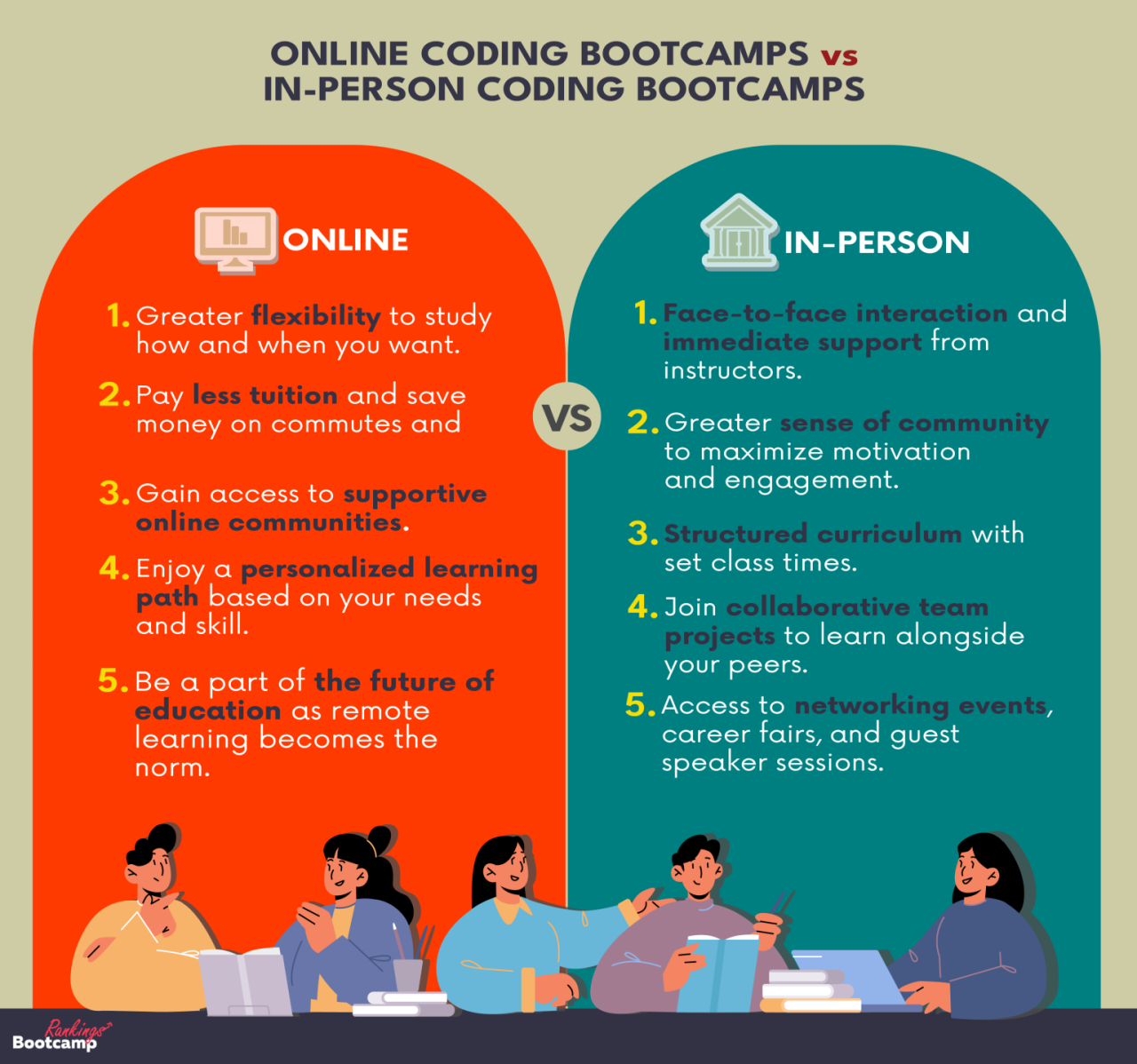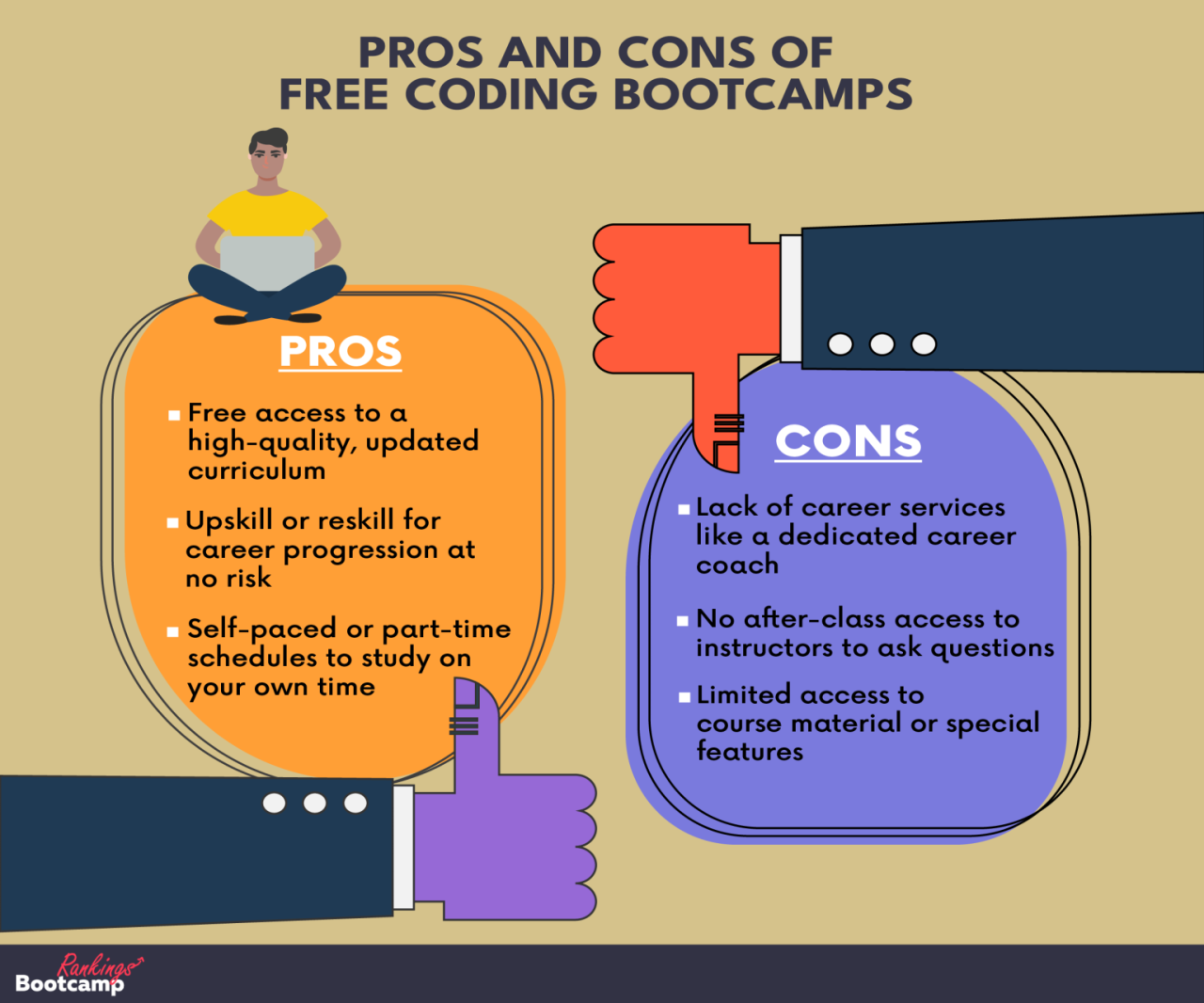Career Prospects After Bootcamps for Non-Degree Holders
Coding bootcamps offer a fast-track route into tech careers, particularly appealing to individuals without traditional computer science degrees. While the effectiveness of bootcamps is often debated, their impact on career prospects for non-degree holders is a significant consideration. This section examines the job placement rates, successful career transitions, and typical roles filled by bootcamp graduates who haven’t pursued a four-year degree.
The job market for tech professionals is highly competitive, regardless of educational background. However, data suggests that coding bootcamps can be a viable alternative to a traditional degree for many individuals. The success of a bootcamp graduate depends heavily on factors such as the quality of the program, the individual’s dedication, and their networking skills. A direct comparison of placement rates between bootcamp graduates and degree holders requires careful consideration of program quality and the specific job roles targeted.
Job Placement Rates of Bootcamp Graduates Without Degrees
While precise, universally applicable figures are difficult to obtain due to variations in bootcamp programs and reporting methodologies, studies and anecdotal evidence suggest that many bootcamp graduates find employment in tech roles. However, these rates often vary significantly depending on the specific bootcamp, the student’s prior experience, and the job market conditions. Direct comparison with degree holders is complex, as degree programs often encompass a broader range of skills and knowledge. Some studies indicate comparable or even higher placement rates for bootcamp graduates in specific niche areas within a shorter timeframe, while others show a lower overall employment rate compared to degree holders across all tech fields. It’s crucial to examine individual bootcamp placement reports critically, understanding their methodologies and potential biases.
Examples of Successful Career Transitions
Many individuals have successfully transitioned into tech careers through coding bootcamps without formal degrees. For example, a former teacher might retrain as a front-end web developer, leveraging their existing communication and organizational skills to build websites. Similarly, a retail manager could become a database administrator, utilizing their analytical skills and experience with managing large amounts of information. These transitions highlight the adaptability and transferability of skills gained in diverse backgrounds when combined with focused bootcamp training. The key to success often lies in effectively showcasing the acquired technical skills alongside transferable skills during the job search process.
Typical Roles Filled by Bootcamp Graduates Without Formal Degrees
Bootcamp graduates without degrees frequently fill roles requiring specific technical skills, often focusing on areas with high demand. These roles often prioritize practical, hands-on experience over extensive theoretical knowledge.
| Role | Average Salary (USD) | Required Skills | Bootcamp Relevance |
|---|---|---|---|
| Junior Web Developer | $60,000 – $80,000 | HTML, CSS, JavaScript, Responsive Design, Version Control (Git) | Highly Relevant |
| Junior Software Engineer | $70,000 – $90,000 | Programming Language Proficiency (e.g., Python, Java), Data Structures, Algorithms, API Integration | Highly Relevant |
| Data Analyst | $65,000 – $85,000 | SQL, Data Visualization (e.g., Tableau, Power BI), Statistical Analysis | Moderately Relevant |
| DevOps Engineer | $80,000 – $110,000 | Linux, Cloud Computing (AWS, Azure, GCP), Automation, Containerization (Docker, Kubernetes) | Moderately Relevant |
Networking and Community Building Opportunities: Are Coding Bootcamps Good For People Without Degrees

Coding bootcamps offer a unique environment for building professional networks, often exceeding the opportunities available in traditional university settings. The concentrated learning period, coupled with a focus on practical skills and immediate career placement, fosters a strong sense of community and collaboration among students, instructors, and alumni. This robust network significantly contributes to the career success of bootcamp graduates, especially those without formal degrees.
Bootcamp students gain access to a variety of networking avenues that directly contribute to their job search. These opportunities often surpass those found in traditional academic environments due to their targeted and industry-focused nature.
Networking Opportunities Within Bootcamps, Are coding bootcamps good for people without degrees
Many bootcamps organize career fairs, bringing in recruiters from various tech companies actively seeking talent. These events provide students with the chance to directly interact with potential employers, showcase their projects, and receive immediate feedback on their skills. Additionally, many bootcamps maintain active alumni networks. These networks offer ongoing support, mentorship opportunities, and access to job postings exclusively available to graduates. Some bootcamps even facilitate mentorship programs pairing current students with successful alumni, providing invaluable guidance and industry insights. Furthermore, many bootcamps integrate networking activities into their curriculum, such as group projects, hackathons, and workshops that encourage collaboration and relationship building among students.
Comparison to Traditional University Networking
While universities offer networking opportunities through clubs, organizations, and career services, the bootcamp environment fosters a more immediate and focused approach. University networking tends to be broader and less industry-specific, often requiring more initiative from the student to connect with relevant professionals. Bootcamps, conversely, actively facilitate these connections, providing a structured environment for networking and career development. The smaller class sizes and intensive curriculum also create a closer-knit community, leading to stronger bonds and more effective collaboration among students. The focus on practical skills and immediate job placement further differentiates the bootcamp experience, making networking a more direct path to employment.
Impact of Strong Networking on Career Success
A strong network is crucial for bootcamp graduates, particularly those without degrees. A robust network can provide access to unadvertised job openings, mentorship from experienced professionals, and invaluable referrals. For instance, a graduate who actively participated in their bootcamp’s alumni network might receive a referral for a position from a former classmate, leading to a quicker and more successful job search. The ability to leverage connections built during the bootcamp experience can significantly reduce the time spent searching for employment and increase the likelihood of securing a desirable role. This is especially valuable for non-degree holders who might face additional challenges in the job market. Many successful bootcamp graduates attribute a significant portion of their career success to the strong networks they cultivated during and after their program.
Skill Gaps and Addressing Them

Bootcamp graduates, while possessing practical coding skills, may encounter skill gaps compared to traditionally educated counterparts. These gaps aren’t insurmountable, and proactive strategies can effectively bridge them, leading to successful career outcomes. Understanding these potential discrepancies and developing appropriate mitigation plans is crucial for career advancement.
Addressing these potential skill gaps requires a multifaceted approach. Bootcamps often focus intensely on practical application, sometimes at the expense of theoretical computer science foundations. This difference in educational focus can lead to a perception of a lack of breadth of knowledge in some areas.
Potential Skill Gaps for Bootcamp Graduates
Bootcamp graduates might lack the theoretical depth in computer science fundamentals often found in degree holders. This includes areas like data structures and algorithms, operating systems, and database design. They may also have less exposure to software engineering principles, such as design patterns, version control best practices beyond the basics of Git, and software testing methodologies. Finally, experience in larger, more complex projects and collaborative software development environments is typically less extensive for bootcamp graduates.
Strategies for Addressing Skill Gaps
Several strategies can effectively address these skill gaps. Self-directed learning is a powerful tool. Numerous online resources, including Coursera, edX, and Udacity, offer courses covering theoretical computer science topics. Furthermore, actively contributing to open-source projects provides invaluable practical experience and demonstrates commitment to continuous learning. Focusing on specific areas identified as weaknesses, such as mastering a particular programming language or framework, through dedicated self-study and projects is another key strategy. Supplementing bootcamp training with targeted online courses or even pursuing a specialized certificate in a relevant area can further enhance one’s skillset.
Employer Perceptions and Mitigation
Employers are increasingly recognizing the value of bootcamp graduates’ practical skills. However, they might perceive a lack of theoretical grounding or experience with large-scale projects. Candidates can address these concerns by showcasing their practical projects, highlighting their problem-solving abilities, and demonstrating a strong work ethic and eagerness to learn. Clearly articulating the specific skills gained during the bootcamp and the self-directed learning undertaken to fill knowledge gaps is vital. Presenting a well-structured portfolio of projects, including detailed descriptions of the challenges faced and solutions implemented, can effectively showcase practical abilities. Emphasizing continuous learning and professional development further strengthens a candidate’s profile. For example, a candidate could mention contributions to open-source projects or participation in online coding challenges to demonstrate a commitment to continuous improvement and professional growth. This proactive approach can effectively overcome any initial reservations an employer might have.
Portfolio Development and its Importance

In today’s competitive job market, a strong portfolio is crucial for coding bootcamp graduates, especially those without traditional degrees. It serves as tangible evidence of your skills and abilities, allowing potential employers to assess your coding proficiency beyond just a resume. A well-crafted portfolio can significantly increase your chances of landing your dream job.
A compelling portfolio showcases your practical application of the skills learned during your bootcamp. It’s more than just a collection of projects; it’s a narrative demonstrating your problem-solving capabilities, coding style, and attention to detail. Employers value seeing how you translate theoretical knowledge into functional, real-world applications. This visual representation of your abilities compensates for the lack of a formal degree, effectively bridging the gap between education and professional experience.
Effective Portfolio Projects for Bootcamp Graduates
Bootcamp graduates can create a variety of projects to showcase their skills. Focusing on projects that demonstrate diverse skills and solve real-world problems is key. For instance, a responsive website for a local business demonstrates front-end skills, while a backend application managing user data showcases proficiency in databases and APIs. A full-stack project, such as a social media clone or an e-commerce platform, would demonstrate mastery of both front-end and back-end development. Even smaller projects, like a well-designed game or a sophisticated calculator, can highlight specific skills and creativity. Remember to choose projects that genuinely interest you, as your passion will shine through in the quality of your work.
Best Practices for Building a Compelling Portfolio
Building a compelling portfolio requires careful planning and execution. First, select projects that showcase a range of skills learned in your bootcamp, focusing on those most relevant to your target roles. Each project should be well-documented with clear explanations of the technologies used, the challenges faced, and the solutions implemented. Clean, well-commented code is essential; it demonstrates professionalism and allows employers to understand your thought process. The portfolio itself should be user-friendly and visually appealing, with a clear structure and easy navigation. Consider using a platform like GitHub to host your code and showcase your projects. Finally, actively seek feedback on your projects from mentors, peers, or instructors to continuously improve the quality and impact of your portfolio. Remember, your portfolio is a living document; update it regularly with new projects and improvements to reflect your ongoing growth and learning.
The Role of Personal Projects and Self-Learning
A coding bootcamp provides a structured foundation, but true mastery comes from consistent practice and independent exploration. Personal projects and dedicated self-learning significantly augment the bootcamp experience, solidifying skills and showcasing your abilities to potential employers. They are crucial for bridging any perceived gaps in your education and demonstrating a proactive approach to continuous improvement.
Personal projects offer invaluable hands-on experience that goes beyond the scope of a typical bootcamp curriculum. By working on projects that genuinely interest you, you deepen your understanding of concepts, explore different technologies, and develop problem-solving skills in a real-world context. This practical application solidifies theoretical knowledge and allows you to build a portfolio that demonstrates your capabilities. Self-learning, meanwhile, allows you to fill in knowledge gaps and stay current with the rapidly evolving tech landscape.
Effective Self-Learning Strategies
Sustained skill development requires a strategic approach. One effective method is to identify specific areas needing improvement and then seek out relevant resources. This could involve online courses (Coursera, edX, Udemy), interactive tutorials (Codecademy, freeCodeCamp), or in-depth documentation from technology providers. Active participation in online communities, such as Stack Overflow or GitHub, allows you to learn from others’ experiences, receive feedback, and contribute your own knowledge. Regularly revisiting and refining previous projects, incorporating new techniques and best practices learned through self-study, is also crucial for continuous growth. For example, a web developer might revisit an older project to implement a more efficient database solution or improve the user interface using a new JavaScript framework.
Compensating for Perceived Bootcamp Shortcomings
Bootcamps, while intensive, may not cover every aspect of software development in exhaustive detail. Personal projects and self-learning directly address this. Let’s say a bootcamp focused heavily on front-end development but offered limited exposure to back-end technologies. A developer could then undertake a personal project that necessitates building a full-stack application, incorporating back-end technologies like Node.js or Python/Django to demonstrate proficiency in those areas. Similarly, a bootcamp might not delve deeply into specific frameworks or libraries. Independent study, combined with personal projects utilizing these technologies, would fill this knowledge gap and build a demonstrable expertise. For example, a developer could choose to learn and implement React or Angular in a personal portfolio project to showcase advanced front-end skills. The key is to proactively identify any perceived weaknesses and actively work to strengthen them through self-directed learning and practical application.


Tim Redaksi